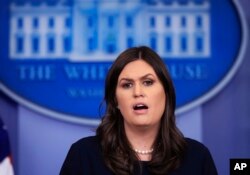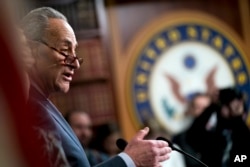Finger-pointing and acrimony surrounding probes of Russian meddling in the 2016 U.S. election intensified Thursday, with the Trump White House and Democratic lawmakers trading accusations of undermining and manipulating investigations that require bipartisan buy-in to succeed.
"There's been a lot of comments about obstruction of justice, and frankly the only people we've seen trying to influence the investigation are former [FBI] director [James] Comey and Democrats in Congress, and that would include Senator Feinstein," White House press secretary Sarah Huckabee Sanders said at a briefing.
Democrat Dianne Feinstein of California caused an uproar earlier this week by releasing the transcript of private conversations between congressional investigators and a political researcher who, on behalf of Democrats, hired a former British spy in 2016 to document any ties between Russia and the Trump campaign.
In the transcript, Fusion GPS co-founder Glen Simpson said Christopher Steele uncovered "alarming" evidence of collusion between the Kremlin and Trump's team and informed the FBI of his findings.
Trump weighed in on Twitter, blasting "Sneaky Dianne Feinstein" for releasing the transcript "in such an underhanded and possibly illegal way, totally without authorization" — an act he called "a disgrace.
The president also called the Russia probe the "greatest single Witch Hunt in American history" and urged congressional Republicans to "finally take control" of the investigation.
Democrats pushed back, defending Feinstein and saying she was forced to act in the face of mounting Republican efforts to thwart and cut short multiple Russia probes on Capitol Hill.
"Their [Republicans'] goal, it seems, is to discredit the investigation so that, ultimately, they can discredit any findings that are detrimental to their party or their president," said Senate Minority Leader Chuck Schumer, a New York Democrat. "President Trump makes this strategy manifest clear as day almost every day on his Twitter feed."
Schumer continued, "Here is the president of the United States imploring his party to take control of the investigation. You never thought you'd hear a president saying something like this. And, frankly, you never thought you'd hear such silence from the other side of the aisle [Republicans]. All of us must choose country over party."
While Special Counsel Robert Mueller is investigating ties between Russia and Trump's inner circle on behalf of the Justice Department, House and Senate investigations were launched with the hope that Republicans and Democrats would set party interests aside and join forces in search of the truth.
"It [bipartisanship] has largely been broken," said political analyst Norman Ornstein of the Washington-based American Enterprise Institute. "This has gotten more than acrimonious."
Ornstein compared the Russia probes to Congress' investigation of the Watergate scandal that caused former President Richard Nixon to resign in 1974.
"What we saw with Watergate was the model of a committee where the ranking Republican set the tone by saying the key here is what did the president know and when did he know it? — and followed through with an investigation with integrity," he said.
Ornstein added, however, that even if congressional Russia's probes falter on partisan lines, "The real test comes with whether the integrity of the Mueller investigation is protected and a bipartisan group of members [of Congress] make it clear that the president can't fire [Mueller] or close off the investigation."










